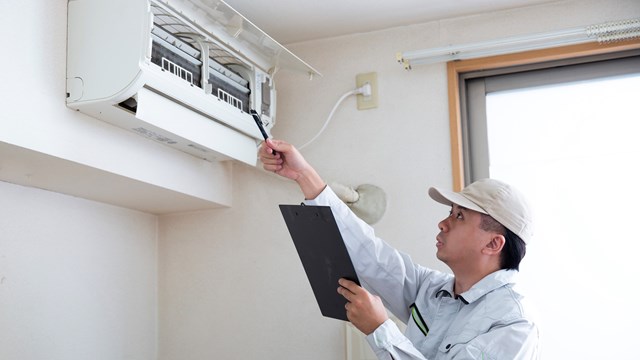
Though necessary, major capital improvement projects—like facade restoration, elevator refurbishment, or window replacement—can often mean big hassles for building residents, particularly if they haven't been properly prepped for the changes and kept in the information loop.
While capital improvement projects signal big changes for a building at large, there's no doubt that one of the most important parts of any big project is communicating with the residents. This communication will help to make the project go smoother and prevent any incident or acrimony along the way.
Why are capital improvements a potential annoyance among building residents? According to C. Jaye Berger, a Manhattan-based attorney specializing in residential construction litigation, the number-one reason is inconvenience.
"It's the barricades, the noise, and the fact that on some capital improvement projects, the contractors have to come in the tenant's apartment and the tenant needs to clear a way," says Berger. "The roof is probably the most inconvenient to those who are under it, because there is always the possibility—if it's not done properly—it might cause a leak that could penetrate into the building."
However, capital improvement projects that directly benefit the residents will have less acrimony from the tenants, says Byron Bell of Byron Bell Architects and Planners in Manhattan.
"The toughest capital improvement projects are the ones where residents do not see a benefit," said Bell. "For example, with any major boiler repair or replacement project, yes, you are getting better heat, but it's relatively hard for most people to understand the process itself. If you are replacing windows, on the other hand, the tenants' apartments may [conserve] heat better, or there may be an improvement in [noise reduction.] They feel like they are getting something for their inconvenience."
Keeping project woes to a minimum starts with the design of the project itself. "The best way for a board to try to minimize capital improvement problems is to ensure that its managing agent and architect/engineer are competent and experienced in such projects, and that all aspects of the project have been well conceived and planned. That will make execution infinitely smoother," says Aaron Shmulewitz, partner at the Manhattan-based law firm of Reed Smith LLP.
Only management and the board should be involved in preliminary project meetings and decisions, unless your bylaws state otherwise. Typically, shareholders do not have a say regarding any aspect of a capital improvement project; these decisions are best left to appointed board members. "Buildings have board of directors who run the building and take responsibility for the decisions on projects like these," says Berger. "If the building were to listen to all the ideas of the tenants, the project would never get done."
Most planned capital improvement projects are completed in the spring or summer when contractors often can work outdoors. However, emergency repairs and replacements can cause projects to begin at any time. "Be careful though," warns Berger. "If you want to work on a project in the fall, and it's not done pretty quickly, winter comes and then you have delays and can't work." Delays and work stoppages can increase residents' stress about the project.
Once the project is well-thought-out and executed, the next step is to have an open line of communication with all the necessary parties.
"Lack of communication is always one of the biggest complaints of residents of multifamily communities," said Jordan I. Shifrin, attorney and author of
"Generally, when there is a big project looming, if the board has a plan as to how to involve the ownership from the beginning, it will reduce a great deal of the animosity and resistance to paying for it," said Shifrin.
Before going ahead with the project, Shifrin recommends first notifying the residents of the problem itself (for example, the roof is coming apart, windows are leaking, etc.), and explaining how serious the problem is, and assuring them that the board is looking into it, but without discussing cost.
"Once the first shoe is dropped, it will diffuse a great deal of anxiety at an early stage," he said. "[Residents] will resign themselves to the fact that a big expenditure is coming and only the diehards will ride it out to the end."
The next step is to meet with all the necessary management parties—including the managing agent, building superintendent, engineer, architect, board members, etc.—and brainstorm about the individual aspects of the project and all the possible concerns of the board, management and tenants, including noise, inconvenience and safety.
Common courtesy is also an important aspect to keeping the peace among residents. For example, disruptive construction noise during the day is more acceptable than noise during evening or late night hours. Keep these factors in mind when planning the project.
If the bylaws state that management must notify the residents about capital improvement projects within a certain time frame, than management should abide by the bylaws. "It's not a legal issue; it's just a matter of good management," says Berger. "Managers want to strike a balance between giving notice and giving a moment's notice."
If the bylaws do not address communication about projects, the board of directors or management should send written notification to all shareholders about any projects that are being started. Notify the shareholders, whether through written communication or on the building's website or e-mail system—whichever works best for the building—about the nature of the project, the projected start and completion dates, and any potential safety or inconvenience issues.
When construction in the building takes place, neighbors like the opportunity to prepare for the sounds and sights of hammers, saws and handtrucks, dumpsters, scaffolding and all the rest.
Notification should also include contact information should any residents have problems or concerns. If the project is a lengthy one, it's wise to periodically update the building's residents on the progress of the project.
When planning a capital improvement project, remember that your building's immediate residents may not be the only ones who are inconvenienced by the building's repair project. Keep in mind that tenants in neighboring buildings might also be affected by the scaffolding, noise and disarray.
"Again, you're not required by law to tell the neighboring building," says Berger, "but work on good neighbor relations. When people don't know what's going on, they assume things—and they can assume things that put you in litigation. If you make some effort to think about neighbor relations, it will come back to help you."
However, Shifrin says that while following these suggestions "should reduce the animus to a minimum, there will always be a few people will be negative about whatever a board tries to accomplish. I always say that one percent of the people cause 99 percent of the problems."
But there is no doubt that regular communication with the building residents and neighbors should help to make the project go more smoothly and add tranquility to an otherwise chaotic time.
Lisa Iannucci is a freelance writer and a frequent contributor to The Cooperator.






Leave a Comment